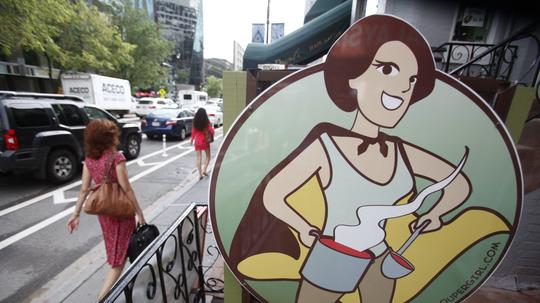
Soupergirl owner Sara Polon stood at the cash register of her D.C. soup company’s Takoma shop March 13, helping her staff handle an influx of customers stocking up on food — and still haunted by a friend’s text message the night before that described the expected coronavirus impact as “apocalyptic.”
Then in the store, someone coughed.
“We shut down both locations and then immediately switched over to delivery,” Polon recalls.
Her decision to close both brick-and-mortar sites 76 days ago came with a price. She shuttered Takoma temporarily, but closed the Dupont Circle location for good, because “I just don’t see a return to business as usual for a very, very long time,” Polon says.
But beyond losing its security deposit before the end of the lease term, set to expire May 31, the move would mean lost revenue.
So she pivoted. She pulled out of the farmer’s market, as the pandemic loomed. She switched to a takeout-only service days before the city’s mandate. And she turned to her delivery model, a fundamental part of the business she started with her mother, Marilyn, in 2008.
But that had involved about 40-50 orders a week. Everyday delivery would be a different ballgame.
It meant multiple innings of trial-and-error until Soupergirl could fulfill orders within realistic timelines. Once the company got that down, local deliveries and national shipping took off, amid heightened demand for its plant-based soups — now serving 120 people a day, Polon says. “We’ve been very fortunate on that front, in that customers supported us, and we were able to make up the revenue from the loss at retail locations.”

Big plans
Soupergirl opened the curtain on 2020 with aggressive growth plans, following a boon from ABC’s “Shark Tank” in 2018. Polon aimed to grow 2019’s revenue by about 70%, she says, declining to disclose specific financial figures. The company was in talks with new potential supermarket partners while growing its direct-to-consumer business. But the pandemic threw that momentum out the door — and with it went some meaningful revenue streams.
Its bottom line took a hit, also from the loss of business at fast casual restaurants that sold Soupergirl products, and suddenly closed. The once reliable supermarket arena became a rollercoaster: first, sales skyrocketed because people hoarded; then crickets came, because consumers had already filled their freezers, Polon says. “We’re flat, and I consider that a huge win.”
Polon has spent recent weeks ramping up safety measures. She worked with her landlord to refurbish her HVAC systems. She picked up an order of facemasks from a local mask maker she found on a Takoma listserv. She bought thermometers, N95 masks, face shields and gloves for her employees, plus fans to keep the air circulating inside. She’s now looking to purchase more equipment to enable social distancing in her kitchens, because “a bottle-filling machine is very expensive, but I’m not asking two people to sit right next to each other,” she says, so until then, she’s staggering her crews. She’s spent about $10,000 on PPE and testing for her team. And she’s trying to set up a contract to have a doctor continue testing her staff each week, she says, but “I have to see if I can afford it.”
The public health crisis brought challenges beyond erratic sales numbers and Covid-related expenses. Polon had to lay off some part-time retail staff, some of whom she was able to rehire for delivery positions. The now 35-person company has 10 fewer part-time workers than it did in January.
And that presented another layer of pressure to stay open, Polon says, recalling tear-filled nights, feeling “scared and trying to understand if this was the right thing to do, to ask my team to come in everyday and work,” she says. “But people wanted to keep working.”
Soupergirl landed loans from both the Small Business Administration’s Paycheck Protection Program, which helped pay staff, and its Economic Injury Disaster Loan Emergency Advance, to help pay vendors so they could keep servicing the business. Polon declined to disclose the loan sizes, but says Soupergirl had seen “a drastic change in cashflow” from the pandemic’s ripple effects, “and those loans just helped us stabilize.”

A turning point
The second week of April brought Passover, a turning point for the business. Soupergirl, a certified kosher company, typically nabs big business during the eight-day Jewish holiday. And this year, that coincided with shelter-in-place directives that kept Washingtonians at home — and hungry.
“We got slammed,” Polon says. “It was absolute chaos.”
The team survived the holiday, then shut down for the next five days, to pause and polish its processes, she says. “We’re realizing, ‘This is it for a while, for a long while — for years, I think,’ so we’re calmly figuring it out.”
Polon’s now building a Rolodex of safety protocols, something that doesn’t officially exist for small business owners, she says. So she hired a new employee to research and gather guidelines from the Centers for Disease Control and Prevention, Johns Hopkins and others, to compose a safety manual — a resource she plans to both implement in her own operations and share with other D.C.-area businesses.
“We are on our own, so the amount of stress that’s on us essential businesses, it’s impossible to put into words, and the responsibility I feel when it comes to keeping my team and my customers safe? It is nothing I could’ve ever anticipated, nothing I ever could’ve planned for,” Polon says, adding: “It’s a lot more than I signed up for.”
Though, she says, “I also feel keenly aware of how fortunate I am. We’re still standing.”
Survival mode
Soupergirl is now adding curbside pickup. It’s consolidating delivery model “to make sure that we can retain a profit,” Polon says. It’s bringing thousands of units of soup each week to a growing group of hospitals and community health clinics, through donations from customers. It’s shooting to raise up to roughly $2 million in funding at some point soon — though that, too, is up in the air. And it’s going to have to end discounts and promos, because the business just can’t afford it anymore, she says. “That’s going to be critical to our survival.”
Now, the District is preparing to enter a phased reopening, as are suburban Maryland and Northern Virginia, where Soupergirl also counts local customers.
The D.C. soup company, however, is not reopening its stores.
“None of the guidance coming out from state, local, federal officials mentions the word, ‘testing,’” Polon says. “What you’re hearing from researchers and scientists is that nothing has changed, and that the key to reopening — is testing and contact tracing. So we’re not reopening.”
It’s a decision she hasn’t taken lightly, she says, acknowledging the importance of reopening the economy. “I get it. I’m a business owner.”
But, she says, “we need to find a way to develop an economy of the future that works. My gut is saying, ‘This isn’t going to work, and this is not safe,’ and it doesn’t mean there’s not a way to do this; there is a way, and we’re not pursuing it.”




